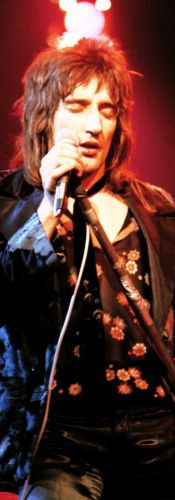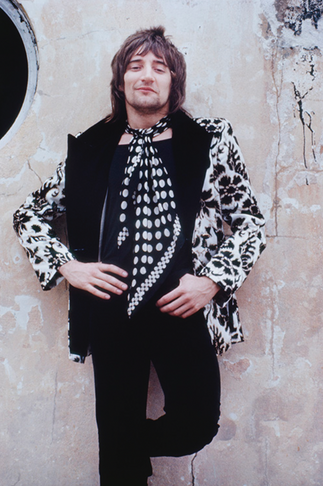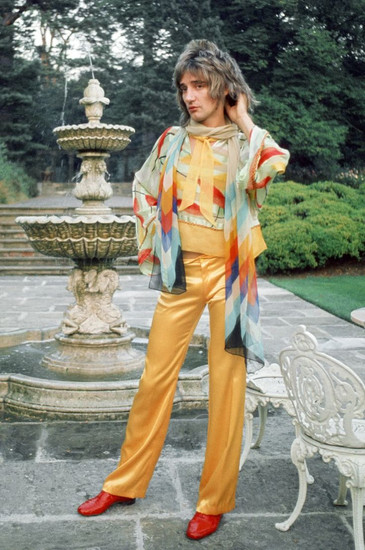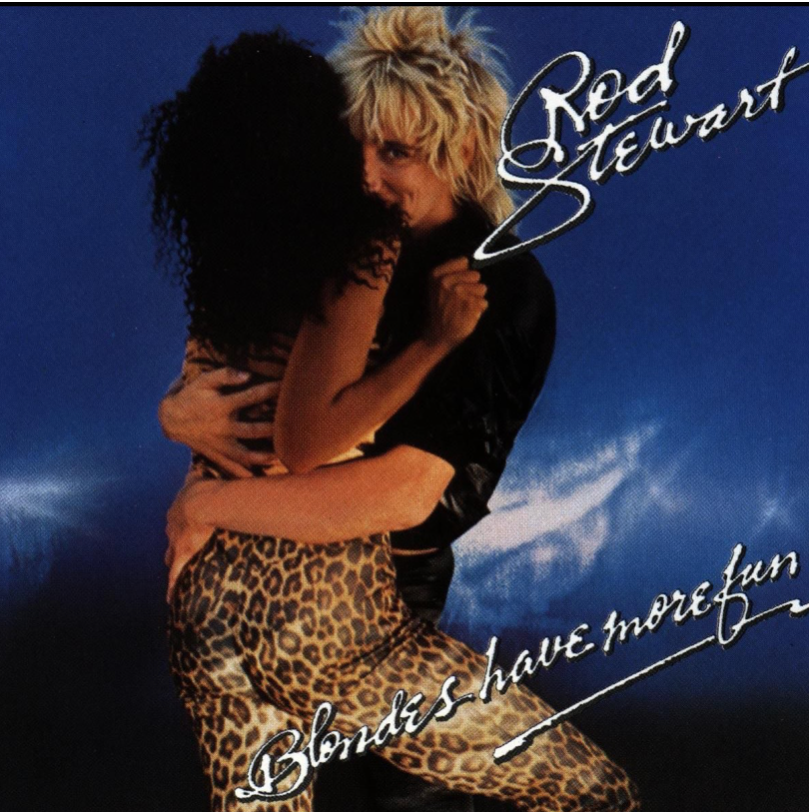Rod Stewart and The Bimbofication of Lead Singers
- Ashley Musante

- Jan 10, 2024
- 10 min read
There’s a lot that comes to mind when the name Rod Stewart is stated: the tossing of the term “sellout”, synth pop, Maggie May, the boring controversies that he’s somehow tied into for no reason, and the hair.
The hair may just be the most famous and influential mane in all of popular music, rivaling even the jet black pompadour of Elvis or the moptops of The Beatles. This is the hair that started the modern rock movement of 1969, the one that created the greatest band of all time inadvertently and is never given its proper flowers for that fact. I guess all this has to finally address the elephant in the room: Led Zeppelin was about the least original idea of 1969, and can owe at least a major slice of their iconic imagery to Rolling Stone magazine's favorite disservice to talent and his bleach-blonde shag.
I mean, to act as if no band had a bimbo of an English lead singer at its helm, a guitar hero behind its creation, an insane yet intricately talented drummer, and a bassist whose image thrives on a false idea of normalcy that existed before 1969 is insane. Mainly because I just described three bands. I mean, that description was a mock up of Led Zeppelin yet perfectly fits The Who, but what about the punky, forgotten middle sibling: The Jeff Beck Group? The group that, in two albums, seemingly invented hard rock, set the precedent for what should be expected of a blues band, AND showcased how to do a tasteful guitar solo. I could talk for days on end about the seemingly endless drip of talent that found a home within the Jeff Beck Group, from it’s titular bandleader to its discovery of one of the best bass-playing guitarists of it’s day or the stellar drum work showcased, but this isn’t about them. Quite frankly, there was nothing special about their appearances, they were all brunettes with a slightly grown out bowl cut who looked just about as ugly as every other British male on the music scene who were nothing quite that special. This is about the token blonde, the token blonde that did his job so well he laid the groundwork for all token blondes after him [which was a lot, mind you].
One of the biggest crimes of musical blasphemy has been the erasure of pre-solo work Rod Stewart. I mean, he gave the blueprint for all that was about to become Robert Plant, then proceeded to give us some of the best glam-blues rock and roll in England with Faces, and then had his solo career. But his work with the Jeff Beck group is a stellar accomplishment, a true look into why exactly a look into his back catalog will find you agreeing that he is one of the best singers to ever do it.
Truth, the group's first record, is easily one of the most important and influential records popular music has ever been given. Made in five days with a level of backhanded pettiness one would only dream of reaching, the group was able to lay the groundwork for not only the future of blues rock but invent the hard rock that Led Zeppelin would go on to get the credit for [Jimmy Page does feature on the album, after all]. The blaring lead guitar, heavy yet understated bass work, and those crashing drums are now a staple of what one would call hard rock. The voice that carries the album is one that had an unequivocal effect on the future of just about every band you know or love. Robert Plant would lift the power and delivery showcased here, adding in his own moaning and vocal inflections, but he could never quite grasp what made the sound of this album so good.

Rod Stewart is a killer singer, there’s no work around that. The sheer number of genres he’s tried and excelled at is proof of this, the emotions he packs into a song on a vocal alone is enough for him to have had a shot as the world’s leading a-capella singer for about six decades now. He doesn’t rely on having to hit the high notes he totally can, and has, hit, nor forcing his voice into a lower register that comes across as not only endless cringey but also satirical and overdone. He’s the world’s leading cover artist with an extensive greatest hits list of works he’s written himself, a man whose voice has barely changed in the decades it’s been given an endless stream of work. Each live performance sounds like a recording, even though there’s something impossible about that fact. I don’t have to prove that Rod Stewart can kill each and every song that comes his way, he’s done it himself and if that’s lost on someone then that is on them.
What he does on Truth is give his now iconic styling to a genre that was growing at the same time he was. There was no such idea of a singer being a technical great, but still singing like a rocker. Rock stars often get flack for not being able to sing because most simply can’t. Rock is about the emotions one can evoke from their instrument of choice, not about how well they can play it, but what’s great about Rod is that he gave way to the popularity of both. To listen to any of his music is to hear a genuinely fantastic singer who knows how to evict those emotions he has too to sell the song he’s singing. On Truth it certainly doesn’t hurt to have the interplay of such an emotive vocalist and emotive guitarist playing off each other, something that’s never been done quite as well as here, but emotive and great guitarists [while never as good or even scraping the echelon of Beck] were nothing all that new to rock music, but a singer doing that? That was new. That was interesting. That was Rod Stewart.
Other than waving in the next era of popular rock music and vocal stylings, there was something else different about Rod: the hair. He stood apart from all contemporaries not just because he was in a complete league of his own talent-wise, but also the blonde hair. Almost every other man on the circuit was a boring brunette, that is until 1969. 1969 would lead Led Zeppelin into the world. Led Zeppelin with their ex-Yardbirds guitarist, Rolling Stone adjacent bass player, and… their blonde lead singer. It could be a coincidence but, was it? It also wasn’t much of a coincidence that Robert Plant seemed to know the whole rulebook Rod had never written on how to do it like him, down to the closed eyes, the lost in emotion microphone twirl, all of it. None of it was new, incredibly Olivia Rodrigo-Deja Vu: “Everything is all reused." That along with the blouses, messy yet infamous blonde shag? It’s clear it was an attempt to capture the lightning in a bottle of the modern blues scene's first bimbi-fied singer, but what exactly led to the bimbofication of what Rod Stewart did with the Jeff Beck Group? The term bimbo is a term that was coined to insult the intelligence of blonde women. If a woman was a bimbo she was all beauty and no brain, as for some
reason a woman will always be judged on her looks and nothing else. Robert Plant was by, at least these standards, a bimbo. He was blonde, known for his looks, and used his sexuality to really drive his popularity. It's hard to tell if there was any thought from Plant when he was doing this [that is using his sexuality, as the blonde and conventional good looks were out of his control for the most part], if the rampant moaning and tight jeans was truly just out of his own desire to be the most sexually forward singer of the 1970s or this idea that if leaning into this untapped niche of the male bimbo. While Plant lifted a lot from Stewarts stint with Beck, this he didn’t.
Rod Stewart was one of the smartest singers in the industry at one point. He knew how to play his cards in ways that would bring him the most success. Juggling a role as Faces lead singer, releasing a solo album every other year, and touring to keep his name in circulation of press and fans alike. After breaking up Faces in 1975 he would begin a career hopping in and out of trends with ease, marketing himself as a glam icon, balladeer, folky songwriter, leading cover artist, and disco starlet by the end of the 1970s alone. You can’t be stupid to change your colors so quickly, quite like you can’t be untalented to excel at all so well. Rod knows how to play the music industry's game, for as unassuming as he's able to come across. His records showcase this, how simple they seem yet a listen through of his demos showcases a man conducting a band to perfection whilst performing himself, leading them to gold no matter how effortless they sound. I don’t even find it shocking that for a short time in the early 70s he let his hair grow out to a natural brown, as that’s almost what would mold him better to the industry. There was no real push that Rod was this “dumb blonde”, he played up the ditzy aspect of his life but never once would it seem during most of the 70s that he wasn’t a smart artist on a level playing field of contemporaries such as David Bowie or Mick Jagger. It was only after the Led Zeppelins grasp on rock culture that Rod really leaned into this image that had been inadvertently birthed by him. This was when he began to sport the leather jumpsuits, bleaching his hair so blonde it could be questioned if the bleach was seeping into his brain, and giving ever so iconic soundbites to the media as “I thought everyone in rock and roll had illegitimate children” or publicly calling his girlfriends social group “full of shit”. This is a stark contrast from the Rod that came before and the one that existed after, just another trend he hopped on to remain the leader of each and every pack simultaneously.
Suddenly it seemed as though the blonde men of the scene were almost playing into this idea they were nothing more than attractive pawns to be pushed around an imaginary board because it made them buckets of revenue. Suddenly it was like there was a push to be the dumb blonde, it was another fad and fashion that ebbed during the 70s rock scene. For a few years it was the idea of being dark and brooding, now it will be as obnoxious and dim as you possibly could. Leave no room for a thought about whether it's an act, dehumanize yourself to the level you let women become dehumanized. In a backwards way, it was the most equality shown via rock music for a time, that suddenly the men were just attractive arm candy to these bombshell women. It was an odd time, no doubt, but I think it honestly made way for this certain image of a pop star still prevalent today. This “himbo” [as the bleach ran out due to Rod Stewart in 1976 for any bimbo to remain] look, the smart but not too smart look is what exactly has forwarded rock music since Robert Plant first utilized it during the early 1970s. Instead of the gold standard of rock musicians being someone like a Jagger or a Beck, two people culturally and intellectually aware of their surroundings who with music, stage show, and competitive marketing know exactly how to play the game and never get sucked away, they have become the exception. People like Tom Petty or Eddie Vedder are considered different from the rest of their contemporaries because they show a certain level of awareness about what exactly they are. Vedder has never played a ditzy role to get himself a sweet spot in rock, and Petty knew how to grab people with a melody and sucker punch them with a lyric. This “bimbofication” of the male rock star happened entirely by accident, with its key inspiration playing the key role in its fall from grace.
While, yes, I did just say that it became commonplace for a himbo to front a rock band, the pivot of the bimbo to the himbo falls with exactly the same person the rise of bimbos started from. A fun fact of sorts is that bimbo, in modern vernacular, started its rise around 1978. By 1978, Rod Stewart had proved himself as one of the leading rock artists on the scene. He was different enough from the hard rockers and made himself palatable to both younger and older audiences by being about as conservative as a manwhore could be. The sweater vests, three piece suits, draping of scarves to cover the indecencies of his mesh top: he was the media's dream. Now all of these decisions can find a home back to Britt Ekland, his girlfriend during these pivotal years, who had such an impact on him that he had in fact changed his style in almost every conceivable way but the point here is that he had changed to become one of the most widely accessible artists to every facet of the general public. But during these pivotal years of change for Stewart, one where his commercial success was so intertwined with his critical, the rise of Led Zeppelin [and their copycats] was taking an unavoidable grasp on certain demographics. 1978 would also see the rise of media discussion of dance music and clubs due to the popularity of the ‘77 film Saturday Night Fever and its stellar Bee Gees-lead soundtrack, something that rock stars took notice of. The Stones had Miss You, Blondie
broke big with Heart of Glass, and Prince flew on the scene with I Wanna Be Your Lover. Rod, never one to let a trend get out from under him, would release probably the biggest hit of the rock-goes-disco fad: Do Ya Think I’m Sexy? The blonde was bleach, the leather pants were certainly a creative choice, and there was almost an offensive amount of leopard print. While being hailed as a disservice to talent, it was also a new beginning for the career that never lulled, one in which anyone who happened to think the Stewart of prior was boring was just pulled into the web of
enjoyment. The album it hailed from? Blondes Have More Fun. The absolute genius Rod Stewart has cleverly helped layer under pounds of glitter is the reason I find him such an alluring artist. I think once Rod pulled the rug out from under the bimbo movement, it slowly decayed. There was no fun once he made it the satire it always had been, the blonde had done what had to be done.
There’s a discussion to be had about the played up sexuality of the males and how they have the choice of sexualization that women don’t. How men like Robert Plant could overtly sexualize something as arbitrary as a hair color and make themselves sex objects whilst women had to always live with the unnecessary and unwanted stereotypes projected from the exact same trait, how with a lack of understanding of the world women and girls are forced to live in that a mockup of a the sexy blonde was not about equality but about personal gain if the sexual advances made to that coveted blonde. A man can play up being a whore, but a woman has no choice but to be viewed as one. And there’s a discussion to be had about how there was no satire of this genre until Rod Stewart got a hold of it. How being the most explicit and annoying person - about the blonde, the disco, the sex - was the only real reason the sexualization of blondes as it was stopped in its tracks. I guess he proved that blondes do have more fun after all, fun dismantling the misogyny in the rock world that is.
















































I found this post very interesting to read! I don't know a lot about the rock world, and I've always thought that most rock music had to do with rebelling against stereotypes. This post showed me how easily it was for a man to choose to use the stereotype of a bimbo in order to gain more popularity, even in the rock world. I thought the last paragraph was very powerful, giving light to the fact that men can choose to be serialized while women don't have a choice. The very last sentence was even more powerful and I think it was a perfect way to end this post!
This blog was so interesting to read! Especially that last paragraph, it's something I never put much thought into. It's definitely an interesting conversation, that men chose to be sexualized during that era, and women were forced to be. It's also compelling to put it in the mindset of today, where sometimes men will get mad if a woman vocalizes her discomfort around being sexualized.